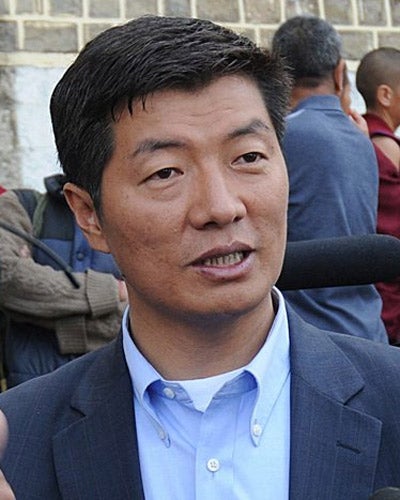Dalai Lama's successor swaps Harvard for the Himalayas

A Harvard academic will make the switch from America's East coast to the foothills of the Himalayas after being elected prime minister of the Tibetan exile community – a role that will see him take over the political duties previously carried out by the Dalai Lama.
Officials in Dharamsala, the Indian hill town that has been home to the Tibetan government-in-exile for 50 years, announced yesterday that 42-year-old Lobsang Sangay had beaten his rivals in a poll involving thousands of Tibetans living around the world.
"It is sobering to realise that nearly 50,000 people in over 30 countries voted in the recent elections. Your overwhelming support is humbling and I will do my utmost to live up to your expectations," Mr Sangay said, in a message posted on Facebook. "I urge every Tibetan and friends of Tibet to join me in our common cause to alleviate the suffering of Tibetans in occupied Tibet and to return His Holiness [the Dalai Lama] to his rightful place in the Potala Palace."
The election of Mr Sangay, who moved to the US 15 years ago on a Fulbright Scholarship, comes at a crucial time for the Tibetan community. While he is not the first person to hold the role, last month the Dalai Lama announced that he wanted to focus entirely on his position as the community's religious leader and give up his political duties. The 75-year-old said he believed that promoting someone else as the political leader would help reduce Chinese influence in the case of his death.
As a result, Mr Sangay, who is currently a research fellow in an Asian legal studies programme at Harvard Law School in Boston, will find himself in a position with more weight than his predecessors. It will be something he desperately needs as he battles for the rights of the Tibetan community, both those in exile and those living inside Tibet.
Among the immediate issues he will be forced to confront will be the recent reported killing of two Tibetans at the Kirti monastery in the south-west Chinese province of Sichuan. "The situation in Tibet is getting worse. Whoever is our leader, we have to take action. We have to think of ways to act," said Tenzin Norsang, an official with the Tibetan Youth Congress, which Mr Sangay once headed. "We have been talking for 50 years. Now is the time we have to make a move."
Amid the exiled community there is much discussion about what position Mr Norsang will take when handling the issue of Tibet's autonomy and the government-in-exile's dealing with the authorities in Beijing. Some have suggested he may be prepared to move beyond the Dalai Lama's moderate policy of the "middle way", which stresses "meaningful autonomy" for Tibet with the protection of cultural and linguistic heritage rather than full-blown independence. At the same time there are others who claim Mr Norsang has already shown himself to be too soft towards the Chinese and who have criticised his decision to travel to Beijing in 2005.
Stephanie Brigden, director of Free Tibet, said she had been in Dharamsala when elections for the post of prime minister, or Kalon Tripa, were going ahead. She said large numbers of people there were enthusiastic about Mr Sangay, particularly because he represented a break from the past and from the Tibetan families who have traditionally held sway within the community.
"The new Kalon Tripa has many challenges ahead of him – not least securing representation with world leaders. Until now, many political leaders have been able to side-step the politics of Tibet by agreeing to meet the Dalai Lama in his religious capacity only," she added. "World leaders will now have the chance to demonstrate their public commitment to finding a negotiated solution for Tibet."
Despite the election of Mr Sangay, the Dalai Lama will remain the figurehead of the Tibetan community while he is alive. He has indicated, however, that by stepping back from a political role, he may make it easier for negotiations with the Chinese authorities to proceed. Despite his cautious approach to relations with China, the Dalai Lama is regularly condemned by Chinese officials who accuse him of being a "splittist" with the desire of breaking Tibet away.
Last night, an official within the Tibetan government said the Dalai Lama was pleased the election had taken place. He added: "The Dalai Lama was very happy... as he thought people took a very active part in the election process."
From Boston to Dharamsala: How his life will change
Swapping the creature comforts of a cosmopolitan US city for a small mountain town in northern India may sound like a recipe for culture shock. But when the new Tibetan Prime Minister, Lobsang Sangay, leaves Boston to take up residence in Dharamsala – the town closest to McLeod Ganj, where the Tibetan government-in-exile has its headquarters – he may not find as many differences as he bargained for.
A wealth of international visitors to Dharamsala, the main tourist hub in the mountainous state of Himachal Pradesh, enjoy dozens of Western-style hotels, internet cafés and restaurants offering a taste of American life. And Mr Sangay, who has never lived in Tibet, will find plenty to make him feel more at home. Learning to cook Tibetan meals and meditation sessions are popular pursuits for first-time visitors. Massachusetts and Himachal Pradesh are also both prone to wet weather, and hot, humid summers.
Boston is proud of its "forward-thinking" stances on controversial issues such as universal health care, but Mr Sangay's new home, at the centre of the Tibetan campaign for autonomy from China, may present a more challenging political atmosphere.
Enjoli Liston
Join our commenting forum
Join thought-provoking conversations, follow other Independent readers and see their replies
0Comments